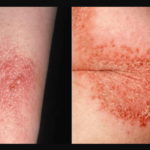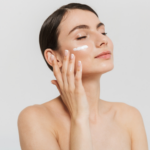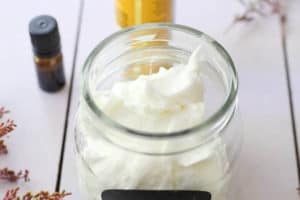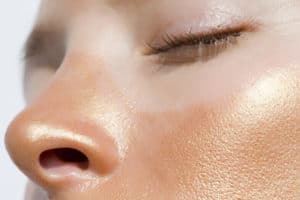Apple cider vinegar consumption has been used medicinally for centuries. As of recent, more and more people are using it topically on their skin.
Is apple cider vinegar good for skin? Apple cider vinegar is certainly good for the skin. It is beneficial to apply apple cider vinegar topically for many people.
If your skin is overly alkaline, then the acidic vinegar can help balance its pH, which will improve its overall health and appearance. However, apple cider vinegar may need to be diluted with water first to avoid irritating your skin.
Also, for an excellent facial wash, take a look at our top pick, the Naturena Apple Cider Vinegar Face Wash:
Read on to learn more about apple cider vinegar and how it is good for the skin. I also include one of my favorite homemade apple cider vinegar treatments.
Click here to see it on Amazon.
What Is Apple Cider Vinegar?
Apple cider vinegar is made by crushing apples and mixing the juice with sugar and yeast. Bacteria are then added, which makes the mixture ferment and turns the sugars into alcohol.
After fermenting for some more time, acetic acid-forming bacteria forms and converts the alcohol into vinegar. Acetic acid is the main component of vinegar.
Apple cider vinegar has been recommended as a folk remedy since the days of the ancient Greek doctor Hippocrates. In the ’70s, drinking it became a popular weight loss fad, but little evidence led it to die down. But what about applying it topically?
Is Apple Cider Vinegar Good for Skin?
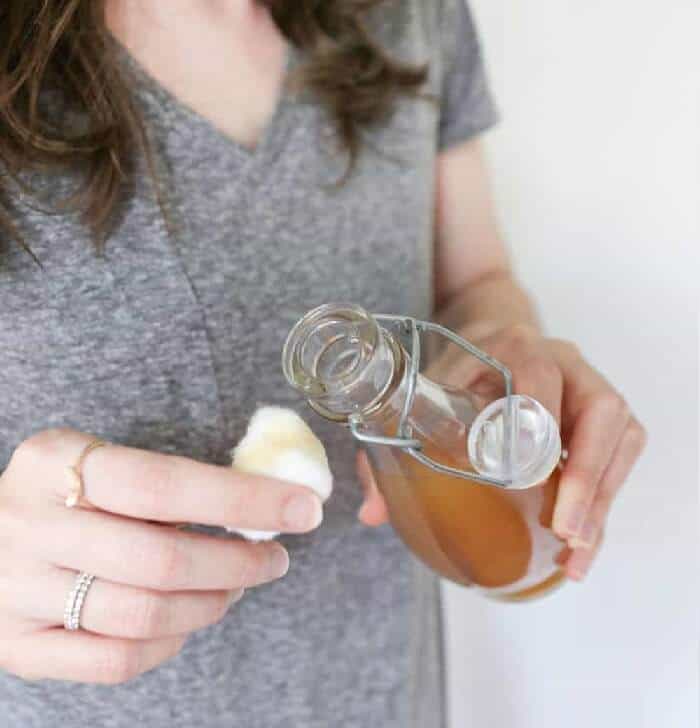
The pH balance both inside the body and on the skin is one of the most important factors in how healthy your skin is. pH stands for “potential of hydrogen,” and it determines how acidic or alkaline something is.
It is measured on a scale that ranges from 0 to 14. A pH of 7 is neutral, less than 7 is acidic, and greater than 7 is basic (or more commonly referred to as alkaline). The optimal pH levels of the human body range from 7.2 to 7.4.
The skin has a thin protective layer on its surface called the acid mantle, and the optimal pH levels range from 4 to 5.5. Damage to this protective layer and its skin cells is caused by many factors as we age, including airborne pollutants, bacteria, and allergens.
There are many ways to balance the pH levels of the skin to the normal value, from diet to skin care.
So is apple cider vinegar good for skin? Apple cider vinegar can certainly be good for the skin when applied topically. Applying apple cider vinegar to your skin can help level the pH balance of the skin cells to a more optimal/neutral pH state (source). This can help heal many skin conditions, including:
- Acne
- Acne scar
- Sunburn relief
- As a skin toner
Acne
Vinegar is a well-known treatment for killing many types of bacteria. The bacteria that contribute to the development of acne is known as Propionibacterium acnes or P. acnes.
There isn’t a ton of research on the effectiveness of apple cider vinegar against acne, but some studies have shown the effectiveness of the acids contained within it (including acetic, lactic, citric, and malic acid).
In one study from 2002, 22 acne-sufferers applied lactic acid lotion to their faces twice a day for one year. At the end of the year, 90-100% reduction of the inflammatory lesions was achieved in 40.9% of patients.
The remaining patients showed a 50-90% reduction, while 2 patients showed less than 50% reduction in the non-inflammatory lesions. So based on the results of this and other similar studies, it’s possible that applying apple cider vinegar to your skin can control acne-causing bacteria.
Acne Scars
If you have acne that has spread and grown over time, it can leave lasting damage in the form of an acne scar. While one or two pimples may heal up quickly, the more inflamed it is, the greater the chance that there will be scarring.
While acne heals, pimples can break open and become infected with white pus. Skin infections can be greater if the sufferer squeezes them open or scratches them if they become itchy.
While you won’t experience an overnight difference, apple cider vinegar can help reduce or eliminate acne scars.
It is naturally drying and works as an astringent on your skin which can help to reduce the sight of the scars. Just avoid keeping the ACV on your skin for too long if you have sensitive skin or dry skin.
Sunburn Relief
Vinegar also will protect your scars from becoming worse when exposed to UVA/UVB rays. I wrote a post titled: “How to Use White Vinegar for Sunburn Relief,” which discusses the amazing health benefits of vinegar for sunburn relief. I have used white vinegar for a homemade sunburn reliever.
It may help you as well if you are suffering from sunburn. Apple cider vinegar also may help when it comes to sunburn relief. Just add the vinegar to a spray bottle and spray the sunburned regions on your body every few hours for relief.
Skin Toner
Bar soaps and soap-based cleansers are typically more alkaline (have a pH above 7), which disrupts the skin mantle. Disrupting the mantel promotes abnormal bacteria growth causing infections, diseases, wrinkles, general skin damage, and other skin problems long-term.
The purpose of using a skin toner is to restore the natural pH of the skin and remove any residual cleanser or make-up on the skin, leaving it clear and ready to be hydrated. ACV can also minimize signs of aging, such as age spots, wrinkles, and fine lines.
So try using ACV as a home remedy instead of an expensive toner. Apple cider vinegar is good for the skin if you dilute it in water and start with small amounts to avoid burning your skin.
If the ACV burns your skin even after diluting it with water, you could consider using a product with alpha hydroxy acid (AHA) or witch hazel instead. Alpha-hydroxy acid is an animal and plant-derived acid used in a variety of skincare products.
Witch hazel is an astringent that contains compounds with antiviral and anti-inflammatory properties. Both alpha-hydroxy acids and witch hazel are a good alternative to ACV if ACV doesn’t agree with your skin.
Can Apple Cider Vinegar Burn Your Skin?
The main complaint people have when applying apple cider vinegar to their skin is that it burns or has other unwanted side effects. Can apple cider vinegar burn your skin? The burn sensation some experience is, of course, because apple cider vinegar is highly acidic.
The most prevalent acid in vinegar is acetic acid, but vinegar also contains some lactic, citric, and malic acid.
Malic acid, citric acid, and lactic acid can all burn your skin if your skin is overly sensitive. The percentage of acetic acid in ACV can range from about 1% to 10%.
Acetic acid is produced industrially both by bacterial fermentation and synthetically. About 75% of acetic acid made for the chemical industry is made by methanol carbonylation.
Unfortunately, different types of bottled ACV don’t list the percentage of acid is in them, so you will have to test by trial and error.
Applying straight-up acetic vinegar to your skin is definitely not a good idea and will give unwanted side effects. But as it is just a small percentage of the vinegar, most people can apply it without too much of a burning feeling. If you have sensitive skin or dry skin, open sores, or cuts, it’s going to burn!
If you feel any burning or other painful side effects, stop applying, or dilute it with water, so it isn’t so strong. Of course, keep it away from your eyes to avoid irritation there.
If you do get it in an eye, don’t panic, it’s not going to make you go blind. Your tears should naturally flush it out, or to quicken the relief, fill a cup with water, hold your eye in the cup and blink several times.
Can I Use Apple Cider Vinegar On My Face Everyday?
This leads to another question: Can you use apple cider vinegar on my face every day? Apply cider vinegar should be safe for most people to apply to their face every day.
After washing your face, put a small amount of apple cider vinegar on a cotton pad or cotton ball and gently apply it to your face. Use spot treatment at first to ensure it doesn’t burn. Wait a few minutes, and then rinse it off with lukewarm water. You can do this every morning and even night also.
Just remember, if it burns at all, it is a sign to dilute the apple cider vinegar in water. Also, start slowly, using the spot treatment method. The spot treatment method involves dabbing the ACV on a small part of your skin to see if it burns before using it on the rest of your skin.
You can also use apple cider vinegar on your skin every second day before trying every day.
Type of Apple Cider Vinegar to Use For Your Skin
Not all apple cider vinegar is the same. Avoid processed or refined apple cider vinegar. Look for bottles labeled unrefined, unfiltered, or ‘raw’ as these are the types that contain the coveted mother culture.
The mysterious ‘mother’ is commonly mentioned when discussing apple cider vinegar. It is a reference to the complex culture of helpful bacteria that is a part of the process.
The mother is the beneficial part of the vinegar, made up of strands of proteins, enzymes, and friendly bacteria that gives it that murky, cloudy appearance.
Bragg’s apple cider vinegar is a popular brand that is unfiltered and raw, found in many grocery stores, health stores, or online. So use apple cider vinegar that has the mother as it is most beneficial for your skin.
Homemade Apple Cider Vinegar Toner
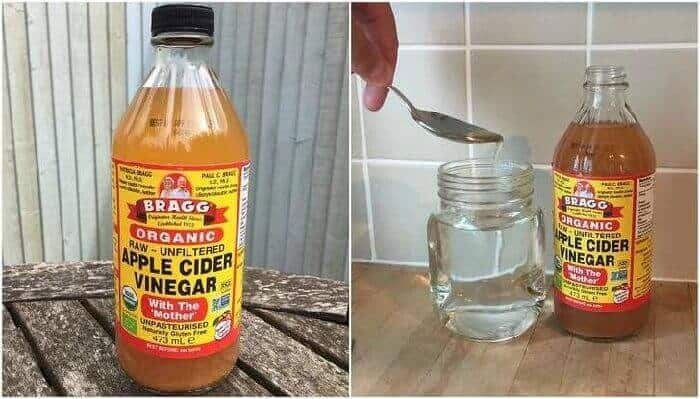
You can apply the apple cider vinegar as is, but this can be too strong for many people and burns their skin. So it is important to dilute it in water by following these steps:
- Pour 1 part organic, raw apple cider vinegar into a container. A glass jar or bottle works great.
- Add 2 parts of filtered water.
- If desired, you can customize the toner by adding ingredients that are beneficial to the skin such as tea tree oil, witch hazel, green tea, lavender, other essential oils etc.
- Shake the bottle well so as to combine the mixture.
Experiment with the ratio of apple cider vinegar to water to see what feels best on your skin. If it burns, then increase the water or decrease the ACV. The apple cider vinegar may smell a bit on your skin, described by some as being like the smell of wet feet, although that can be left to interpretation!
How Often to Apply Apple Cider Vinegar to Your Skin
For many people, it’s best not to apply apple cider vinegar more than once a day as it can be too harsh for sensitive skin or dry skin. And nighttime is more common than morning for applying just in case there is some lingering smell.
If you find it dries your skin too much, then spread out its use over more days and/or add a higher ratio of water to ACV.
Here’s an example of an easy-to-follow routine:
Morning:
- Wash face in the shower or at the sink with just water or with a gentle skin cleanser.
- After the shower, apply your favorite moisturizer.
Night
- Wash face with a gentle, skin foaming cleanser that does not irritate your skin.
- Apply the ACV, diluted half with water (or a ratio that is best for your skin). Use a cotton swab or cotton ball to dab it gently onto your skin. Remember, stay clear of the eyes!
- After using ACV, finish by applying your favorite moisturizer. Your skin will have dried out quite a bit from the ACV, so it’s important to moisturize after.
Conclusion
So is apple cider vinegar good for your skin? Apple cider vinegar is good for most people’s skin. There are many skin benefits when applying ACV topically, primarily being that it is acidic, so it balances out more alkaline (acne-prone) skin.
But everyone’s skin is different, so test carefully and with small amounts so as to avoid burning your skin.
Use organic, raw apple cider vinegar, and avoid processed and unrefined vinegar. Dilute it with 1 part ACV to 4 parts water. If you feel burning, then increase the water and decrease the apple cider vinegar.
If you don’t feel burning or any positive improvements over time, then try increasing the apple cider vinegar and decreasing the water.




![Neutral Skin Tone Defined [and Best Colors for Neutral Skin] neutral skin tone](https://skincaregeeks.com/wp-content/uploads/2021/05/neutral-skin-tone-150x150.png)

